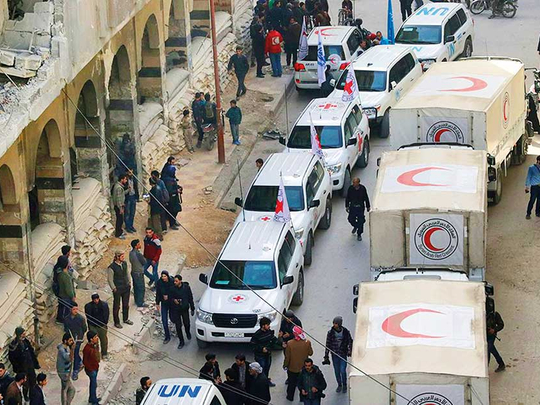
Beirut: The first aid delivery in weeks to reach the besieged eastern suburbs of Damascus was cut short after Syrian regime forces began shelling the area while aid workers were still inside, a local council said Tuesday, amid a renewed escalation in the regime’s deadly aerial and ground campaign.
Aid trucks had to leave before they could finish unloading supplies on Monday, as the eastern Ghouta suburbs suffered their worst day of violence since the UN Security Council demanded a 30-day ceasefire for Syria.
The Syrian American Medical Society charity, which supports hospitals in eastern Ghouta, said 79 people were killed in shelling and air strikes, as the regime, supported by Russia’s military, pushed its assault on the rebel-held suburbs, where the UN estimates close to 400,000 people are trapped under unmanageable levels of violence.
The Britain-based Syrian Observatory for Human Rights monitoring group said 80 civilians were killed on Monday.
Air strikes continued Tuesday. The opposition’s Syrian Civil Defence search-and-rescue group reported at least nine people were killed in air strikes on the town of Jisreen, in eastern Ghouta. The group, also known as the White Helmets, added that two of its volunteers, and 28 others, suffered difficulties breathing following shelling on the town of Hammouriyeh on Monday evening. It accused the regime of using “poison gas.” The Observatory reported 18 people suffered breathing difficulties, without attributing a cause.
It was the eighth allegation of chlorine gas use reported by the Syrian American Medical Society this year. The reports could not be independently confirmed, and Russia used its Security Council veto to freeze the work of a UN body investigating such reports earlier this year.
Still, the allegations could provoke a response from Washington, which says it could take military action against the Syrian regime for continued chemical weapons use against its own people.
The Security Council resolution, which passed unanimously on February 25, has gone unheeded. Monday’s aid shipment was the first to enter eastern Ghouta amid weeks of a crippling siege and a regime assault that has killed close to 800 civilians since February 18. Aid agencies, however, said the regime removed basic health supplies, including trauma, surgical kits and insulin, from the convoys before they set off.
The International Committee for the Red Cross also confirmed that its joint convoy with the United Nations had to leave before offloading all its supplies on account of the deteriorating security situation Monday.
Ingy Sedky, the ICRC spokeswoman in Syria, said most of the aid from a 46-truck convoy was delivered to the town of Douma in eastern Ghouta but the mission was cut short before the rest of the supplies could be unloaded.
Iyad Abdul Aziz, a member of the Douma Local Council, said nine aid trucks had to leave the area after regime shelling and air strikes intensified in the evening.
The convoy that reached Douma on Monday carried only a fraction of the relief needed for the estimated 400,000 people trapped under the regime’s siege.
The UN’s humanitarian office said the convoy carried food for 27,500 people.
But it said the Syrian regime offloaded 70 per cent of the health supplies, including trauma and surgical kits and insulin, before allowing the convoy to enter eastern Ghouta.
The regime routinely removes life-saving medical supplies from aid convoys, in a pattern of denying such aid to civilians living in opposition areas. UN officials have complained for years about such actions by the Syrian regime.
Russia’s Defence Ministry said it was extending an offer to allow armed rebels to leave eastern Ghouta with their families and weapons. Russia has been a staunch ally of Bashar Al Assad, helping him turn the tide of the bloody civil war in his favour.












